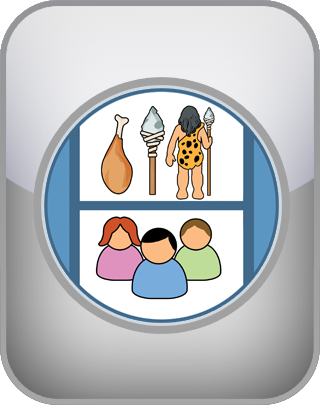Hunter-Gatherer Health Test
One theory behind the rise in modern lifestyle diseases, such as obesity and depression, is that we have strayed from the hunter-gatherer way of life that shaped our evolutionary past. Mark van Vugt and his team at Vrije Universiteit Amsterdam created a tool to evaluate how closely one's lifestyle aligns with this ancestral model. Their research suggests that the more our contemporary habits deviate from those of hunter-gatherers, the greater the negative impact on health. The test assesses how well your lifestyle reflects the hunter-gatherer way across seven key areas.
To take the test, enter your input below.
Question 1 of 35
I have very few, if any, close friends whom I could count on if I had big problems.
| Disagree | Agree |
NEXT
The IDRLabs Hunter-Gatherer Health Test is developed by IDRLabs. The IDRLabs Hunter-Gatherer Health Test is inspired by the evolutionary mismatched lifestyle scale (EMLS), authored by Vugt et al. of Vrije Universiteit Amsterdam and published in the scientific journal Heliyon. IDRLabs is not affiliated with these authors or institutions.
The test provides feedback such as the following:
Hunter-gatherer societies were characterized by highly active lifestyles and nutritionally balanced diets, free from the pressures of modern technological adaptation and digital distractions. Unlike contemporary humans, our predecessors lived in harmony with their basic needs and were less driven by vanity or hedonistic tendencies. Researchers from Vrije Universiteit Amsterdam have identified a link between the increasing divergence from these ancestral lifestyles and a decline in both physical and mental health. Specifically, the greater the mismatch between modern living conditions and evolutionary adaptations, the higher the risk of developing issues such as sleep disturbances, chronic diseases, poor mental health, depression, and anxiety. In essence, the research underscores the importance of understanding the impact of modern lifestyle choices on health, framing the growing discrepancy between current living patterns and evolutionary predispositions as a key factor in the prevalence of physical and psychological ailments.
Low Media Use: Reflects how much time individuals spend on platforms like Facebook or Twitter. Low scores indicate excessive use, leading to comparisons, shallow relationships, and isolation. Higher scores suggest less social media use, aligning with ancestral behaviors focused on face-to-face communication and deep connections. Reducing social media can improve mental health, self-esteem, and belonging, highlighting the contrast between the digital age and the human need for direct interaction.
Low Vanity: Measures focus on appearance, driven by societal standards or self-presentation. Low scores indicate a strong emphasis on looks, often shaped by social comparisons, unlike ancestral times when appearance was tied to survival. High scores suggest less concern with appearance, reflecting evolutionary norms where attractiveness was based on physical abilities. Shifting focus from vanity can reduce stress and boost self-esteem by prioritizing internal values over external validation.
Social Support: Reflects the strength of social connections, such as family and friendships. Low scores suggest isolation or limited support, contrasting with ancestral communities where strong social bonds were crucial. High scores indicate solid networks of support, aligning with human history. Strong social ties enhance well-being, reduce stress, and promote resilience, echoing the importance of community in human evolution.
Home Environment: Reflects exposure to nature, population density, and social connections. Low scores suggest living in crowded areas with limited access to nature, unlike the environments humans evolved in. Higher scores indicate more natural surroundings, lower population density, and familiarity with neighbors, similar to ancestral living conditions. Connecting with nature and close communities promotes relaxation and reduces stress.
Romantic Relationships: Describes how people form intimate connections today. Low scores indicate a reliance on dating apps or casual encounters, contrasting with the organic relationships formed in ancestral communities. Higher scores reflect deeper, more stable connections formed through community interactions, promoting emotional well-being and long-term satisfaction.
Physical Activity: Measures how much a person exercises and moves daily. Low scores suggest a sedentary lifestyle, while high scores reflect regular movement, similar to our active hunter-gatherer ancestors. Physical activity boosts heart health, reduces anxiety, and mirrors the frequent movement vital for survival in the past. Incorporating regular movement today can improve strength and well-being while counteracting the harmful effects of inactivity.
Unprocessed Diet: Evaluates nutrition quality, comparing processed, sugary foods to whole, fresh foods like fruits and vegetables. Low scores indicate unhealthy eating, while high scores reflect a diet resembling ancestral habits. Eating nutrient-dense, unprocessed foods can improve health, lower disease risk, and enhance mental clarity.
Total Hunter-Gatherer Health: Your overall degree of accordance with the hunter-gatherer lifestyle as measured by the evolutionary mismatched lifestyle scale (EMLS). Higher scores indicate greater hunter-gatherer health.
The IDRLabs Hunter-Gatherer Health Test is inspired by the evolutionary mismatched lifestyle scale (EMLS) developed by Mark van Vugt and colleagues at Vrije Universiteit Amsterdam. While the IDRLabs Hunter-Gatherer Health Test is inspired by the evolutionary mismatched lifestyle scale (EMLS) authored by Vugt et al., it cannot be used to provide clinical assessments or an accurate evaluation of your features. Clinical assessments should always be done in cooperation with a mental health professional. For more information about any of our online tests and quizzes, please consult our Terms of Service.
References
- Vugt et al. Mind the gap: Development and validation of an evolutionary mismatched lifestyle scale and its impact on health and wellbeing. Heliyon, 2024.

